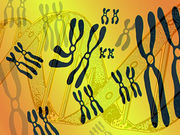And erlotinib therapy beyond progression may delay salvage tx for some patients
MONDAY, Jan. 4, 2016 (HealthDay News) — For patients with non-small-cell lung cancer (NSCLC) with activating epidermal growth factor receptor (EGFR) mutations, erlotinib is active, and treatment beyond progression is feasible and may delay salvage therapy in selected patients, according to a study published online Dec. 30 in JAMA Oncology.
Keunchil Park, M.D., from the Sungkyunkwan University School of Medicine in Seoul, South Korea, and colleagues examined the efficacy of first-line erlotinib therapy in patients with NSCLC with activating EGFR mutations in the Asian Pacific trial of Tarceva as first-line in EGFR mutation (ASPIRATION). Patients received 150 mg/day erlotinib until disease progression; after this point, therapy could be continued at the discretion of the patient and/or investigator. Patients were followed for a median of 11.3 months.
The researchers found that 176 of the 207 intent-to-treat patients had a progression-free survival event (PFS1; time to Response Evaluation Criteria in Solid Tumors 1.1 progression or death) at a median of 10.8 months; following progression, 78 discontinued and 93 continued erlotinib therapy. In the 93 continuing patients, the median PFS1 was 11.0 months, while median PFS2 (time to off-erlotinib progression if erlotinib therapy was extended beyond progression) was 14.1 months. For patients with exon 19 deletions or L585R mutations, median PFS1 and PFS2 was 11.0 and 14.9 months, respectively.
“ASPIRATION supports the efficacy of first-line erlotinib therapy in patients with EGFR mutation-positive NSCLC and that treatment beyond progression is feasible and may delay salvage therapy in selected patients,” the authors write.
Several authors disclosed financial ties to biopharmaceutical companies, including F. Hoffmann-La Roche, which funded the study and markets erlotinib.
Copyright © 2015 HealthDay. All rights reserved.








